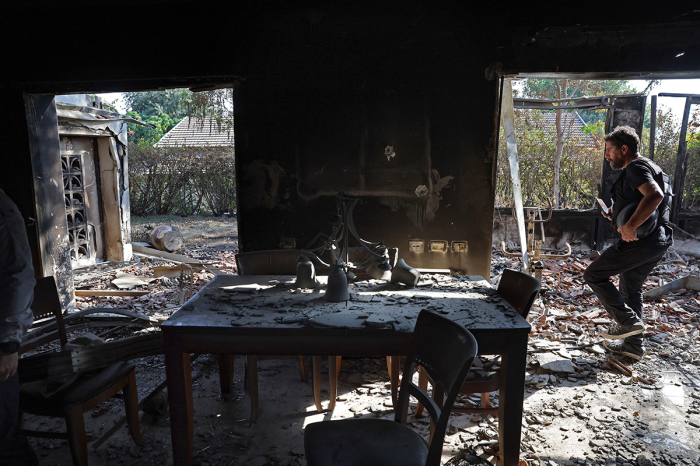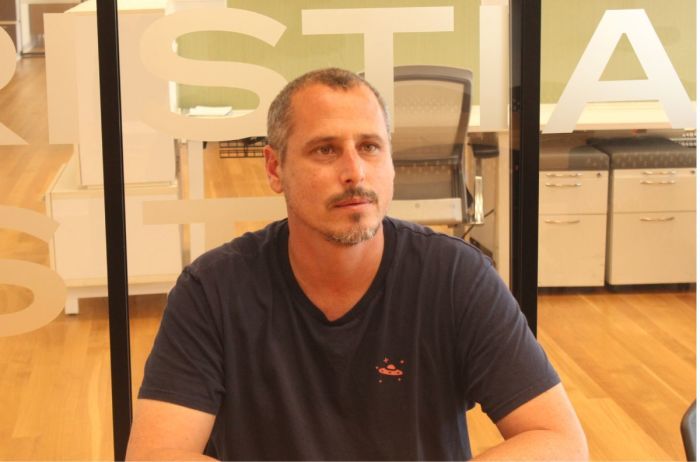'A horrible new life': Oct. 7 kibbutz massacre survivor wants safety ensured before returning home

WASHINGTON — A former Israeli soldier who survived Hamas' Oct. 7 raid on his community believes the Israeli government must do more to improve the community's security and recover the people taken hostage by the terror group.
Naor Packiarz and his family have lived at Kibbutz Be'eri since 2000, where he and his wife, Adi, have raised their four children: Nir (17), Shachar (15), Maayan (10) and Ella (8).
Like many other Israeli men, Packiarz previously served in the military for three years as part of Israel's mandatory military service policy. Now in the reserves, he has served as the marketing manager for Be'eri Printing for the past three years.
Kibbutz Be'eri was one of the Israeli communities Hamas militants attacked during its Oct. 7 onslaught that resulted in the deaths of at least 1,200 people, primarily civilians, and the abduction of over 240 individuals.
Packiarz told The Christian Post in an interview Friday that the day before the attack, the family held a celebration to commemorate the anniversary of Kibbutz Be'eri, founded on Oct. 6, 1946. This is why many of the family's friends were in the area on that day. He also told CP that Oct. 7 happened to be Maayan's 10th birthday.

Early in the morning, Packiarz and his family heard missiles and alarms going off, which did not seem abnormal as most Israeli citizens are used to these types of attacks coming from Gaza. The family retreated to the safe room, but Packiarz decided to head to the porch to see what was happening.
At one point, the father said he could hear people screaming in Hebrew and other voices answering in Arabic, as well as the sound of gunfire near his home.
"So, I understood at that point that it wasn't just something happening from Gaza," Packiarz said. "It was happening inside of the kibbutz."
The father went in and out of the safe room, and as an ex-soldier, he could not stay put. From his porch, he could see Hamas militants had set the house of one of his friends on fire, although the friend happened to be in Cyprus with his family at the time.
According to Packiarz, members of the kibbutz community tried to remain in contact with one another during the attack through applications such as WhatsApp. Packiarz said that he and his family sheltered in the safe room for at least 20 hours, and during the attack, his wife spoke with her sister on the phone.
Hamas militants had set fire to the home of Packiarz's sister-in-law, which was also located in Kibbutz Be'eri. Although the extremists attempted to break in, the sister-in-law and her family were saved by the arrival of the Israeli military. According to Packiarz, the first force of the Israeli army did not arrive until 9:30 a.m. the next morning.
Throughout the day, Packiarz continued receiving messages from kibbutz members about people who had been killed or had their homes destroyed.
Packiarz said he and his family tried to remain in touch with his wife's father, but they eventually lost contact with him.
"We understood that if we were going to get out of this, we're going to have a horrible new life or a different kind of life because something very bad is happening," the Kibbutz Be'eri member said.
Around 2 a.m. on Sunday, a group of Israelis who heard what was happening in the kibbutz came and rescued Packiarz and his family. An 11-membered squad at the kibbutz, which the father noted was not part of the Israeli army, also worked to save people during the attack.
According to Packiarz, the Oct. 7 assault showed community members that they must "defend [themselves] and not wait for someone to come and rescue [them]."
Israel responded to Hamas' attack by launching an offensive in Gaza with the stated goal of eradicating Hamas, which has controlled the Gaza Strip since 2007, and securing the release of the hostages. Recent reports have suggested that more than one-third of the Israeli hostages still in captivity may have died. The Hamas-run Gaza Health Ministry reports that around 35,000 people have died since the war began. Those figures don't distinguish between civilian and combatant deaths.
Packiarz and his family have lived at a hotel near the Dead Sea since the attack, which is where many members of their community are also staying. While attending the funeral of a friend killed by Hamas a few days after the attack, Packiarz learned that his father-in-law had also been murdered.
Despite the loss, Packiarz and other members of Kibbutz Be'eri's printing press began working on Oct. 8 to restore the company's operations, noting that the printing press is the "heart" of the community." The company's employees resumed work on Oct. 10, and Israeli President Isaac Herzog rededicated the printing press during an October visit to the kibbutz.
"We knew rebuilding the kibbutz could take a while, and it could be a few years before people are able to go back to the kibbutz," he said. "But if we want our members to have the option to come back, then we have to fix and deal with the heart of the kibbutz, which is our printing press."
This week, Packiarz met with lawmakers in Washington, D.C., including Republican Sen. Marco Rubio, R-Fla., to discuss efforts to rescue the individuals still held captive by Hamas. Packiarz said that the Israeli government talks about how it wants to eradicate the terror group and rescue the hostages, but he believes it needs to prioritize the hostages.
He also stated that he wouldn't return to Kibbutz Be'eri unless the Israeli government could ensure the safety of its members.
"We're not going to go back to sleeping with a M16 beneath the pillow," Packiarz said. "We will only go back if we feel that our kids can walk around the kibbutz and feel safe."
Samantha Kamman is a reporter for The Christian Post. She can be reached at: [email protected]. Follow her on Twitter: @Samantha_Kamman




























